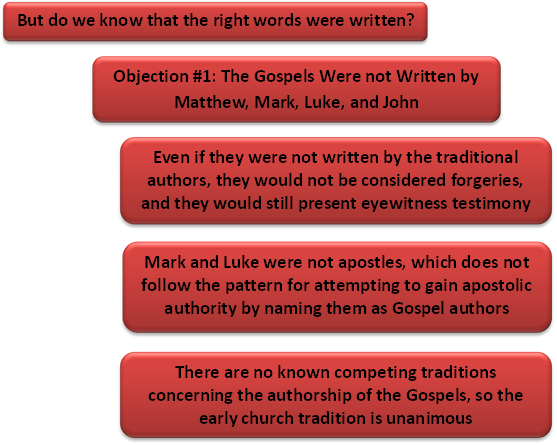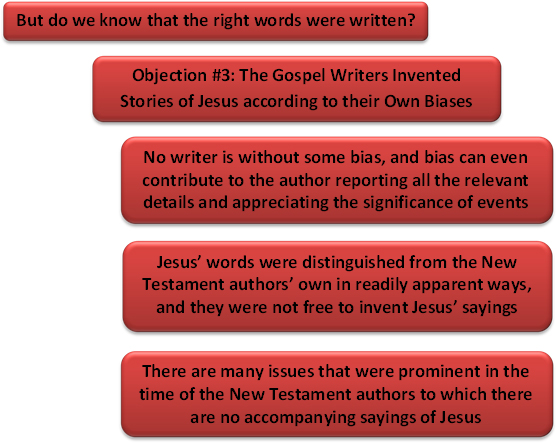By Matt Lefebvre
This post is a continuation of the series on the reliability of the Bible. Please see the introduction and Part 2a if you have not read them yet.
Introduction
 “Some scholars seem to think that the more skeptical they are, the more critical they are. But adopting an excessive and unwarranted skeptical stance is no more critical than gullibly accepting whatever comes along.” (Craig Evans, Fabricating Jesus, p.46)
“Some scholars seem to think that the more skeptical they are, the more critical they are. But adopting an excessive and unwarranted skeptical stance is no more critical than gullibly accepting whatever comes along.” (Craig Evans, Fabricating Jesus, p.46)
“This overly skeptical thinking, for example, leads to the conclusion that much of what Jesus said in public or to his disciples in private was either forgotten or was irrelevant and that, what eventually came to be written in the Gospels was for the most part from later Christians, not from Jesus himself. Indeed, this is absurd. That is, if Jesus really said little of lasting significance and was unable to train his disciples to remember accurately what little he did say, then we must really wonder why the Christian movement emerged at all.” (Craig Evans, Fabricating Jesus, p.47)
Evans makes an important point. Is it really reasonable to believe that Jesus, whom many consider to be one of the most influential leaders in history, was largely unable to influence His own close followers? Proponents of this kind of unwarranted skepticism would much rather come up with extravagant explanations for the beginnings of Christianity than take the text at face value. In the previous article, I gave various reasons to take the text at face value. In the process, I mentioned that there are some objections that could be brought against the reliability of the Gospels, and I will attempt to address a few of them in this article. There will always be skeptics, but I must ask whether their skepticism is warranted or not.
Addressing Objections
Objections of the sort I will describe are not only offered by the overly skeptical, so it is also instructive to see the responses to more moderate skepticism. As I will describe below, even if some of the charges brought against the Gospels were to be granted, I do not think it would show as much as the skeptic intends. At the end of reading this article, there may still be honest disagreement about the degree to which the Gospels are reliable. However, I would hope that there would at least be considerably less disagreement concerning the fact that the Gospels are reliable. That being said, I personally consider the Gospels to be very reliable and I will be defending that perspective against the following objections.
If you are only interested in one particular objection, feel free to read it on its own, as the arguments are largely independent.
Objection #1: The Gospels Were not Written by Matthew, Mark, Luke, and John
Objection #2: The Gospels Contain Contradictions
Objection #3: The Gospel Writers Invented Stories of Jesus according to their Own Biases
Conclusion
 In this article, I have examined varying degrees of skepticism toward the reliability of the Gospels. In examining this range of skepticism, I have explained that granting some of these objections does not necessarily damage the general reliability of the Gospels, as many critics clearly intend it to. If the traditional authorship of the Gospels is wrong, that is fine. They still present eyewitness testimony and do not explicitly claim a particular authorship. If there are a few contradictions in the Gospels, that does not automatically negate their historical reliability. If the Gospel authors are biased, that does not prevent them from recording accurate history, and it may even help.
In this article, I have examined varying degrees of skepticism toward the reliability of the Gospels. In examining this range of skepticism, I have explained that granting some of these objections does not necessarily damage the general reliability of the Gospels, as many critics clearly intend it to. If the traditional authorship of the Gospels is wrong, that is fine. They still present eyewitness testimony and do not explicitly claim a particular authorship. If there are a few contradictions in the Gospels, that does not automatically negate their historical reliability. If the Gospel authors are biased, that does not prevent them from recording accurate history, and it may even help.  That being said, I have also suggested that we can take the evidence to the skeptic and see if their position is really warranted. There are good reasons to support the traditional authorship of the Gospels. There are ways to explain apparent contradictions, if there is willingness to put in the extra effort that it takes. This should especially be the attitude in light of undesigned coincidences. Finally, the Gospel writers may have been biased, but that did not lead them to wholesale fabrication of sayings of Jesus. I do not imagine I have convinced everyone to take all of my views, but I hope I have at least challenged what many have taken for granted. I believe that the Gospels are very reliable and I have presented much evidence to that effect. The question remains, however, whether what they put in writing is what we have now, and it is that question to which the next article in this series speaks.
That being said, I have also suggested that we can take the evidence to the skeptic and see if their position is really warranted. There are good reasons to support the traditional authorship of the Gospels. There are ways to explain apparent contradictions, if there is willingness to put in the extra effort that it takes. This should especially be the attitude in light of undesigned coincidences. Finally, the Gospel writers may have been biased, but that did not lead them to wholesale fabrication of sayings of Jesus. I do not imagine I have convinced everyone to take all of my views, but I hope I have at least challenged what many have taken for granted. I believe that the Gospels are very reliable and I have presented much evidence to that effect. The question remains, however, whether what they put in writing is what we have now, and it is that question to which the next article in this series speaks.



